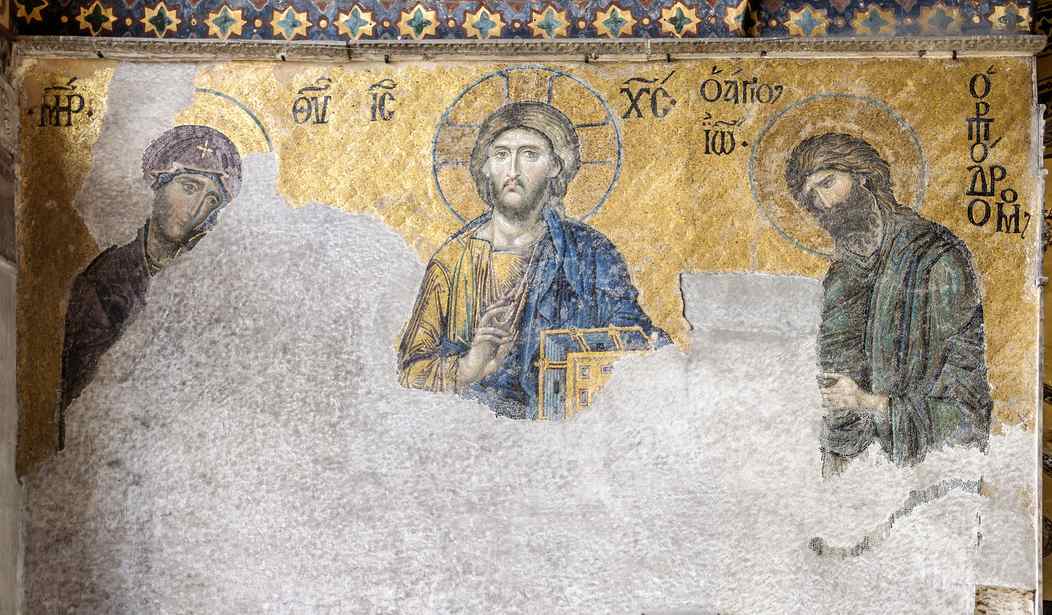With the Biden regime taking a wrecking ball to the foundations of the American Republic, there is definitely an apocalyptic vibe in the air these days. All is not lost, however; as the sage philosopher Yogi Berra noted long ago, “It ain’t over ‘til it’s over.” If Americans want to prevent it from being over any time soon, we would do well to learn the lessons of the past and try to avoid making the same mistakes that other great nations of old made.
When we’re talking about the decline and fall of great nations, the Roman Empire immediately springs to mind, thanks to the eighteenth-century English historian Edward Gibbon’s bright and cheery classic, The Decline and Fall of the Roman Empire. It is important to bear in mind, however, that the Roman Empire did not actually fall in 476, the date that history books and a Google search will give you.
As Empire of God: How the Byzantines Saved Civilization explains, the emperor Constantine the Great made Constantinople the principal capital of the Roman Empire early in the fourth century, and the Roman Empire endured there nearly a thousand years after the fall of its Western provinces, finally succumbing to the jihad warriors of the Ottoman Empire in 1453. While the Roman Empire in Constantinople is frequently referred to as “the Byzantine Empire,” the people who lived in it never referred to themselves as “Byzantines.” Whenever they were asked, they said that they were Romans. They considered themselves to be the living exponents of the civilization of Julius Caesar and Mark Antony, which was, as far as they were concerned, the civilization that was practically synonymous with civilization itself.
Empire of God demonstrates that innumerable things that we take for granted today as part of our cultural and intellectual landscape would never have existed at all without the Byzantine Empire, that is, the Roman Empire in Constantinople. The West’s philosophical, political, artistic, architectural, and theological traditions, among a great deal more, germinated in Constantinople and its environs, although nowadays most Westerners have no idea what the Byzantines (a term I use so that you know who I mean, as opposed to the earlier stages of the Roman Empire in Italy) have given us.
It could, however, have lasted even longer. One of the tragedies that slowly unfolded throughout the history of the empire in Constantinople was the growing estrangement between the Church of Rome and the Church of Constantinople, an estrangement that finally culminated in 1054 in the Great Schism between what we know today as the Roman Catholic Church and the Eastern Orthodox Church. But 1054 was neither the beginning nor the end of the story. The two Churches represented two theological traditions that ultimately grew so far apart that the gap was, or appeared to be, unbridgeable. After 1054, when the empire was increasingly imperiled, facing an existential threat from Islamic jihadis, emperors more than once appealed for help from the West, and more than once, that help was offered with strings attached that made it unacceptable to the Byzantines.
The deeper problem was that as a result of the schism, Western Europeans tended to see the Byzantines as alien, as rebellious schismatics instead of brother Christians who desperately needed help. And so when the help came, it often turned out to be a double-edged sword, as when the Crusaders sacked Constantinople and drove the emperor from the city in 1204. The emperor and the Ecumenical Patriarch of Constantinople even concluded a reunification of the Churches in Florence in the 1440s, on terms that were more submission than reunion; the help that came as a result, however, was too little and too late, and the empire finally fell in 1453.
Related: How the Byzantines Saved Civilization
What if the Europeans had seen the Byzantines as brothers, despite their differences, and offered help against their enemies with no strings attached? The Roman Empire might still exist today, and the world would be unimaginably different.
The lessons for our own day are obvious. Today, America faces existential threats, and many wonder once again if a nation conceived in liberty and dedicated to the proposition that all men are created equal can long endure. Yet as these threats escalate, we have disunity in the ranks of the patriots that makes the Great Schism seem like a playground argument. It is time to recall Benjamin Franklin’s sage counsel, “Let us hang together, or we will all hang separately.” Whether you love Trump or hate him, there is no time to lose: hanging day is drawing nearer.










Join the conversation as a VIP Member